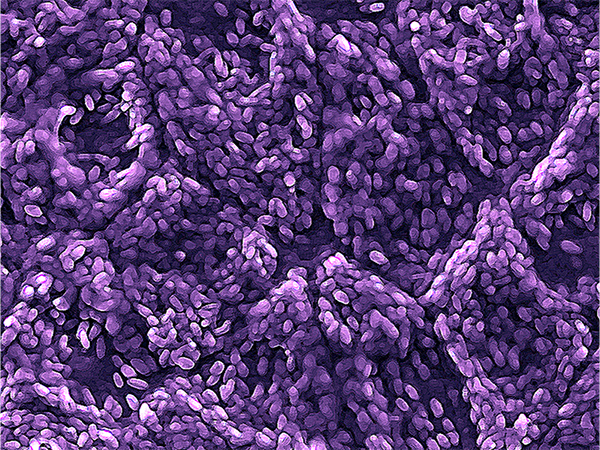
Physicians and researchers at the USC Roski Eye Institute have collaborated with other California institutions to show that a first-in-kind stem cell–based retinal implant is feasible for use in people with advanced dry age-related macular degeneration. The results of their phase I/IIa study, which was funded in part by the California Institute for Regenerative Medicine (CIRM), were published today in Science Translational Medicine.
The treatment, which consists of a layer of human embryonic stem cell–derived retinal pigment epithelium cells on an ultrathin supportive structure, was implanted in the retina of four patients by a USC Roski Eye Institute surgeon. The patients were followed for up to one year to assess its safety. There were no severe adverse events related to the implant or the surgical procedure, indicating that the treatment was well-tolerated. There was also evidence that the implant integrated with the patients’ retinal tissue, which is essential for the treatment to be able to improve visual function.
“This is the first human trial of this novel stem cell–based implant, which is designed to replace a single-cell layer that degenerates in patients with dry age-related macular degeneration,” says lead author and surgeon for the study Amir H. Kashani, MD, PhD, assistant professor of clinical ophthalmology at the Keck School of Medicine of USC. “This implant has the potential to stop the progression of the disease or even improve patients’ vision. Proving its safety in humans is the first step in accomplishing that goal.”
Dry age-related macular degeneration is the most common type of age-related macular degeneration. Over time, it can lead to loss of central vision, which can diminish people’s ability to perform daily tasks like reading, writing, driving and seeing faces. Age-related macular degeneration affects approximately 1.7 million Americans and is projected to rise to almost 3 million by 2020. It is a leading cause of severe visual impairment in adults older than 65.
As part of the study, the research team also performed a preliminary assessment of the therapy’s efficacy. One patient had improvement in visual acuity, which was measured by how many letters they could read on an eye chart, and two patients had gains in visual function, which was measured by how well they could use the area of the retina treated by the implant. None of the patients showed evidence of progression in vision loss.
“Our study shows that this unique stem cell–based retinal implant thus far is well-tolerated, and preliminary results suggest it may help people with advanced dry age-related macular degeneration,” says coauthor and lead inventor of the implant Mark S. Humayun, MD, PhD, director of the USC Institute for Biomedical Therapeutics, co-director of the USC Roski Eye Institute, affiliate principal investigator with the Eli and Edythe Broad Center for Regenerative Medicine and Stem Cell Research at USC and University Professor of Ophthalmology at the Keck School. “CIRM has provided a conducive environment for stem cell research at the USC Roski Eye Institute and the Keck School of Medicine by providing funding for our clinical trial, along with a generous gift to the Eli and Edythe Broad Center for Regenerative Medicine.”
Humayun, David R. Hinton, MD, professor of pathology at the Keck School, and Dennis O. Clegg, PhD, University of California, Santa Barbara Wilcox Family Chair in BioMedicine and co-director of the campus’ Center for Stem Cell Biology and Engineering, co-invented the implant.
Collaborating institutions for the study include Regenerative Patch Technologies LLC, which also contributed to the funding of the study, as well as Camtek LLC, the California Institute of Technology, Retina Vitreous Associates Medical Group, California Retina Consultants, Atlantis Eyecare, City of Hope, University of California, Santa Barbara and Denney Research Center. Additional sources of funding for the study include Lori Mars gift, William K. Bowes Foundation, Vermont Community Foundation, Breaux Foundation, Wilcox Family Foundation and Research to Prevent Blindness.
For more information about the study, visit https://clinicaltrials.gov/ct2/show/NCT02590692?term=nct02590692&rank=1. To participate in the study, please call (323) 442-6335.
